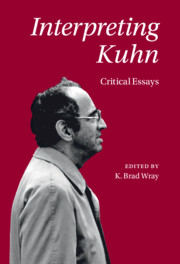Book contents
- Interpreting Kuhn
- Interpreting Kuhn
- Copyright page
- Dedication
- Contents
- Figures
- Contributors
- Acknowledgments
- Abbreviations
- Introduction
- Part I Foundational Issues
- Chapter 1 The Genealogy of Thomas Kuhn’s Metaphysics
- Chapter 2 Kuhn’s Kantian Dimensions
- Chapter 3 A Public Intellectual and a Private Scholar
- Chapter 4 Kuhn and Logical Positivism
- Part II Three Core Concepts
- Part III Kuhnian Themes
- Bibliography
- Index
Chapter 3 - A Public Intellectual and a Private Scholar
On Thomas Kuhn, James B. Conant, and the Place of History and Philosophy of Science in Postwar America
from Part I - Foundational Issues
Published online by Cambridge University Press: 25 June 2021
- Interpreting Kuhn
- Interpreting Kuhn
- Copyright page
- Dedication
- Contents
- Figures
- Contributors
- Acknowledgments
- Abbreviations
- Introduction
- Part I Foundational Issues
- Chapter 1 The Genealogy of Thomas Kuhn’s Metaphysics
- Chapter 2 Kuhn’s Kantian Dimensions
- Chapter 3 A Public Intellectual and a Private Scholar
- Chapter 4 Kuhn and Logical Positivism
- Part II Three Core Concepts
- Part III Kuhnian Themes
- Bibliography
- Index
Summary
This essay examines Thomas Kuhn’s education and collaboration with Harvard President James Bryant Conant to consider his evolving view of relations between scholarship and politics. Aspects of Kuhn’s unpublished Lowell Lectures of 1951, correspondence with Philipp Frank from 1952, and Kuhn’s thoughts about general education from 1955 are examined to illustrate Kuhn’s intellectual movement away from the political interests and engagements of his youth and away from the salutary civic roles that Conant intended history of science to play in American education. Kuhn’s conception of what counts as methodological study of science and his conception of scientific communities, firmly separated and insulated from the sociology of public life, are upheld as central for understanding how, despite Kuhn’s formative relationship with the public-intellectual Conant, Kuhn evolved in the 1950s a style of professional scholarship about science that reached its fruition in the Structure of Scientific Revolutions.
Keywords
- Type
- Chapter
- Information
- Interpreting KuhnCritical Essays, pp. 45 - 64Publisher: Cambridge University PressPrint publication year: 2021



